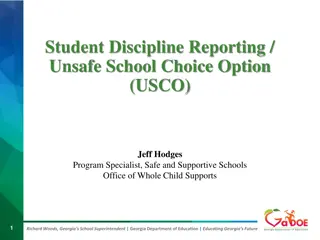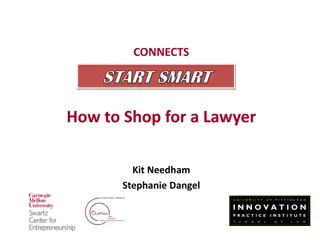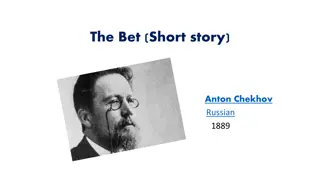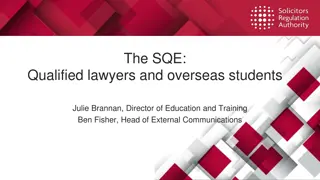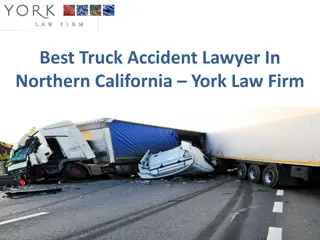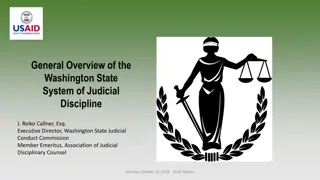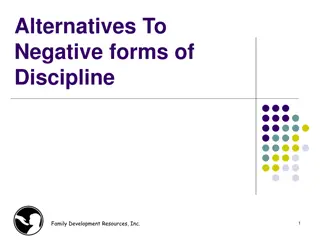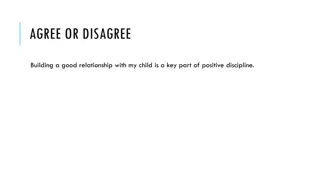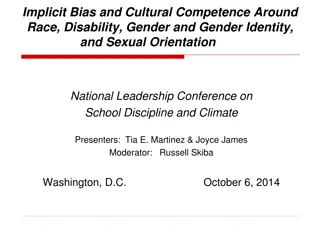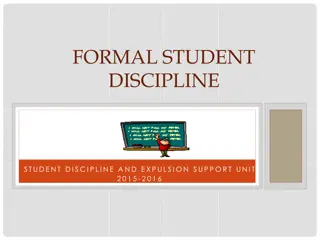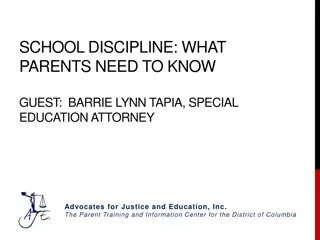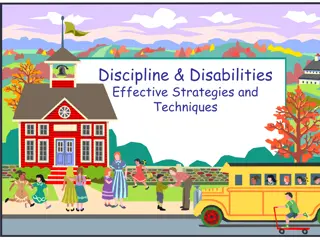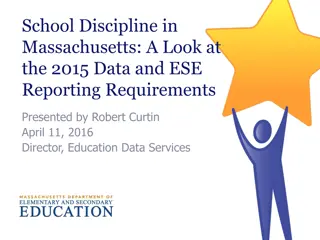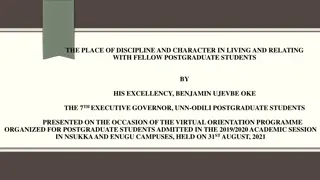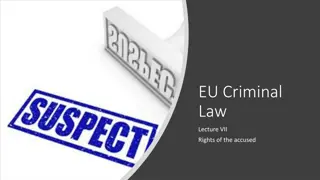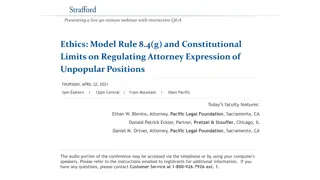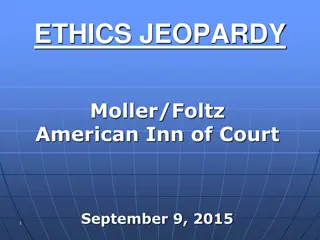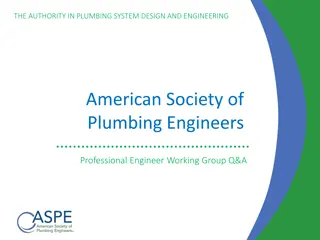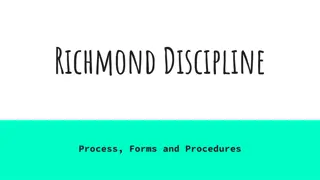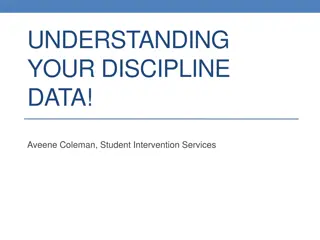Understanding Minnesota's Lawyer Discipline System
Explore the workings of Minnesota's Lawyer Discipline System, including the processes, roles of key individuals, and the entities involved in handling complaints against attorneys. From the oversight by the Minnesota Supreme Court to the Lawyers Professional Responsibility Board to the Office of Lawyers Professional Responsibility and District Ethics Committees, this system ensures the accountability and integrity of legal professionals.
Download Presentation

Please find below an Image/Link to download the presentation.
The content on the website is provided AS IS for your information and personal use only. It may not be sold, licensed, or shared on other websites without obtaining consent from the author. Download presentation by click this link. If you encounter any issues during the download, it is possible that the publisher has removed the file from their server.
E N D
Presentation Transcript
The Life Cycle of a Complaint, and the Role of the DEC Timothy M. Burke Deputy Director, OLPR Tim.Burke@courts.state.mn.us; 651-296-3952 Nancy Norman Sommer Chair, 21stDistrict Ethics Committee Nancy.Norman@co.anoka.mn.us; 763-324-5411 1
Outline of Presentation Who We Are and What We Do Complaint Process Decisions to Investigate Potential Outcomes Office Information and Statistics (Context) Services and Resources of the OLPR Questions
Minnesotas Lawyer Discipline System Minnesota Supreme Court Authority over all aspects of attorney regulation, including admittance to bar, Rules of Professional Conduct (MRPC), and discipline Original jurisdiction over attorney discipline cases
Discipline System (contd) Lawyers Professional Responsibility Board (LPRB) 23 volunteer members; 14 lawyers and 9 non-lawyers Duties include general supervision of OLPR, probable cause determinations for public discipline, and review of non-public dispositions of OLPR
Discipline System (contd) Office of Lawyers Professional Responsibility (OLPR) Agency of Court established to investigate cases of lawyers alleged disability or unprofessional conduct (Rule 2, RLPR) Also serves an educational and outreach role to public and bar regarding professional responsibility Funded by portion of annual license fees paid by attorneys, as well as professional firm fees and costs imposed on disciplined attorneys Director, Susan Humiston, serves at pleasure of Court, accountable to LPRB and through Board to Court; appointed to a two-year term March 7, 2016 12 attorneys (including Director), 7 paralegals and 12 staff Handles between 1200-1300 complaints annually
Discipline System (contd) District Ethics Committee (DEC) Local Bar Association Committees established to investigate cases of lawyers alleged unprofessional conduct (Rule 3, RLPR) Comprised of a Chair appointed by Supreme Court, and at least four other members appointed by local Bar Association At least 20% of members must be non-lawyers Investigate about 250 complaints annually 21st DEC (Anoka County) generally investigates about 6 complaints per year
How Does a Complaint Get Filed? Mail Fax Online (includes options for the following languages: Hmong, Russian, Somali and Spanish) In-person (ADA compliant office)
A Complaint Has Been Filed - Now What? Initial Review by Duty Attorney Does the complaint provide a basis for a reasonable belief that misconduct may have occurred? If NO - complaint dismissed w/o investigation If YES - a Notice of Investigation is prepared and the complaint is investigated by a DEC or the Director s Office
The Rules The RLPR are the procedural rules that govern the disciplinary process Rule 8 (a) Initiating Investigation. [U]pon a reasonable belief that professional misconduct may have occurred, the Director may make such investigation as the Director deems appropriate as to the conduct of any lawyer or lawyers. Assuming the facts as stated, does the alleged conduct constitute a violation of the Rules of Professional Conduct? Court-appointed counsel in pending matters, fee disputes, malpractice claims
Hypothetical Husband is involved in dissolution from wife. Husband files a complaint against wife s attorney alleging that wife s attorney is making things unnecessarily difficult in the divorce. He alleges that wife s attorney is short with him, is condescending in her communications with him, and is making unreasonable demands just to make herself look good in the eyes of her client (complainant s soon to be ex-wife). He would like her investigated.
Summary Dismissal Again, Director may initiate an investigation upon a reasonable belief that professional misconduct may have occurred. If no such basis, the Director does not investigate and issues a summary dismissal
Who Investigates (generally)? OLPR DEC Respondent already on a caseload All others (the majority) Trust account audits Matters that involve sensitive topics County Attorney complaints Out-of-state respondents Prisoner complaints Complex or solely legal issue complaints Judge initiated complaints 12
Notice of Investigation (NOI) NOI requires lawyer to respond in 14 days to the complaint Rule 8.1, MRPC, & Rule 25, RLPR, require cooperation Quickest way to go to public discipline fail to respond to NOI If the complainant is a client of respondent, must also provide copy of response to client, Rule 20(a)(5), RLPR Complainants including those who are not clients, have the right to respond to the lawyer s response. Rule 6(d), RLPR. 13
Privileged Information in Response to Complaint Rule 20(a)(5), RLPR Response to complaint that involves information as to which another client has a privilege may be deleted from the response prior to providing complainant with a copy. Similarly, when providing a complainant with a copy of respondent s response pursuant to Rule 6(d), RLPR, investigators will be sensitive to issues of privilege, but only if they are aware. 14
The 21st DEC Who are we? Attorney Members Nancy Norman Sommer Mark Berglund Kelly Boyd Louis Jungbauer Kelsey Kelley Nicole Kettwick M. Ryan Madison Jennifer Moreau Virginia Murphrey Jerry Sisk Non-Attorney Members Ben Sime Gary Patterson Jens Norgaard Courtney Jasper
How are members appointed Nominations from other members Personal Knowledge Reach out to the Bench Once identified & qualified the ACBA must appoint each member. Member serves for a 3 year term max 2 terms. After a break, may again serve 2 terms of 3 years each
When the DEC Investigates: Chair receives notice of new investigation Review Roster of next investigator Conflicts check Refer investigation to investigator Assign a mentor if new investigator Review report with investigator if requested Report & Recommendation is completed within 90 days from Chairs receipt (Rule 7(c), RLPR)
When the DEC Investigator completes their investigation: Meeting of Committee to review and vote on recommendation
What have we investigated: 1. Failure to maintain contact/lack of communication 1.4 2. Diligence 1.3 3. Competence 1.1 4. Advertising issues 7.2 5. Solicitation issues 7.3 6. Conflict of Interest 1.8 7. Candor to the tribunal 3.3 8. Duties to prospective clients 1.18 9. Conduct prejudicial to the administration of justice 8.4 10. Contact with a represented party 4.2
DEC Options for Recommendation Discipline Not Warranted (DNW) Insufficient clear and convincing evidence of a rule violation. Private Admonition Rule violation has been established by clear and convincing evidence but the violation is isolated and non-serious. Public Discipline (Referral to Panel of Board/a/k/a Charges) Rule violation has been established by clear and convincing evidence and it cannot be said that the violation was isolated and non-serious. Investigate the Matter Further Committee is split on determination; cooperation of one or more parties has been less than complete; matter complained about does not show violation but another issue has arisen that should be looked at, etc. 20
DEC Recommendations *** DEC recommendations are not binding on the Director *** In re Nwaneri, 896 N.W.2d 518, 523-524 (Minn. 2017). See also Rule 8, RLPR DEC investigation and report should be received within 90 days of DEC receiving the complaint, unless good cause is shown. Rule 7(c), RLPR. 21
Process When Recommendation Returned to OLPR If DNW Randomly assigned to Senior Assistant Director to review. Senior Assistant Director will either agree and sign off on DNW or disagree and state reason. If disagree with DNW, the file then gets sent to the Director for in-house assignment. Some reasons for not signing off on a DNW include: Some possible violations (issue spotting) missed (e.g., retainer agreement language clear violation but not part of complaint). Complainant never had a chance to respond to the lawyer s response (or was never contacted). Assistant Director does not agree with the analysis. All allegations of violations have not been addressed or investigated. 22
Discipline Not Warranted (DNW) Respondent & complainant receive a copy of determination which explains the basis If the complainant is unhappy with the Director s determination, the complainant may appeal that determination 23
Process Cont. If Admonition, Further Investigation, or Public Discipline Recommended Director assigns to an attorney in-house for review. Attorney reviews the recommendation and determines if follow-up is needed, if the recommendation is consistent, and may seek additional information from parties if necessary. Typically sends DEC report and recommendation to respondent for review and response before taking further action. Generally, if DEC recommends admonition or public discipline and the Director issues a DNW, we contact investigator to let them know why. No official standard of review or deference provided to DEC determinations, but we take seriously and rely upon the work of the DECs. Generally DECs do an excellent job and we agree most of the time; periodically, we disagree. 24
Discipline Warranted Discipline that can be imposed: Admonition Probation Public Reprimand Suspension Disbarment
Admonition (Private) In any matter, with or without a complaint, if the Director concludes that a lawyer s conduct was unprofessional but of an isolated and non-serious nature, the Director may issue an admonition. Rule 8(d)(2), RLPR
Private Probation In any matter, with or without a complaint, if the Director concludes that a lawyer s conduct was unprofessional and that a private probation is appropriate, and the Board Chair or Vice-Chair approves, the Director and the lawyer may agree that the lawyer will be subject to private probation for a specified period up to two years, provided the lawyer throughout the period complies with specified reasonable conditions. Rule 8(3)(i)
Private Probation When? Between An admonition: In any matter, with or without a complaint, if the Director concludes that a lawyer s conduct was unprofessional but of an isolated and non-serious nature, the Director may issue an admonition. and Public discipline: Misconduct that is either serious, not isolated, or possibly both. Misconduct is amenable to correction through supervision.
Private Probation What? For a specified period, up to two years (subject to an additional two years) Ability to file a petition for disciplinary action for failure to comply with the terms of the probation or further misconduct Specified reasonable conditions (related to the underlying misconduct)
Common Probation Conditions Cooperate fully with the Director s Office in its efforts to monitor compliance with the probation Supervision by another lawyer Written office procedures Limitations on area of practice Abstain from alcohol and other mood-altering drugs Initiate or continue treatment with mental health professional Submit to urinalysis Submit trust account books and records to Director
Appeals Complainant appeals DNW s Admonitions Private probations Lawyer admonition appeals
Office Statistics 2018 Complaints 1,222. Active lawyers in MN 25,000 (29,000 licensed) 2018 Public Discipline: 45 Lawyers Total 8 Disbarred 23 Suspended 8 Publicly Reprimanded/Probation 6 Reprimanded Private Discipline: 14 Private Probations 117 Admonitions 2015 record year: 65 attorneys publicly disciplined
Advisory Opinion Service Available to licensed MN attorneys OLPR attorneys will provide no-cost verbal opinion on application of specific facts to rules; Confidential; non-binding on third parties No opinion will be offered on (1) conduct of third parties, (2) where conduct has already occurred, and (3) OLPR does not approve lawyer advertising, but will advise rules relating to same In 2016, the OLPR provided 1890 opinions. Options: Submit a written request on line (preferred where facts are complicated or detailed); call 651-296-3952 or toll-free 1-800-657-3601 and ask for the A/O attorney Website: http://lprb.mncourts.gov 33
Client Security Fund Available to compensate clients who have been victims of dishonest conduct by an attorney that results in a direct loss Loss must arise from an attorney-client relationship Must be caused by dishonest conduct of attorney Direct loss is compensable; consequential damages are not Has paid out $7.4 million over life of the fund relating to 578 claims against 169 lawyers Funded by $12 from annual registration fee www.csb.mncourts.gov 34
Closing Questions? Thank You! 35


